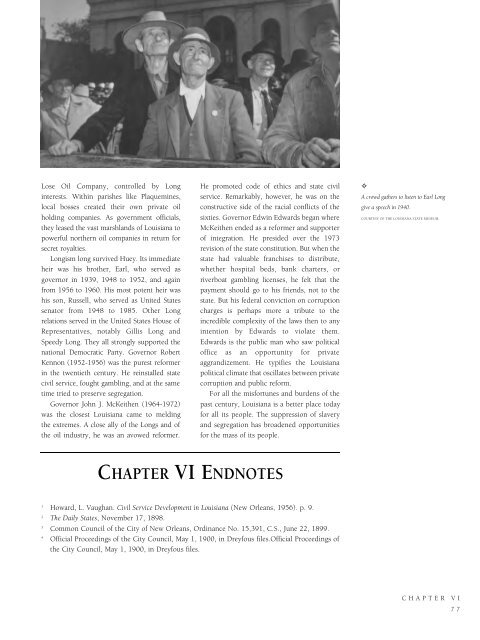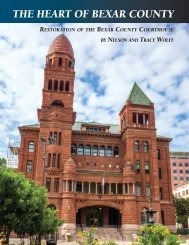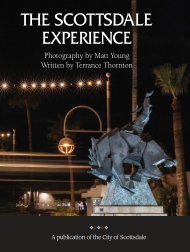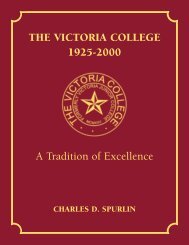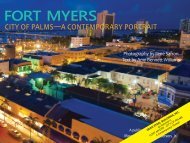Historic Louisiana
An illustrated history of Louisiana, paired with the histories of companies, families and organizations that make the state great.
An illustrated history of Louisiana, paired with the histories of companies, families and organizations that make the state great.
Create successful ePaper yourself
Turn your PDF publications into a flip-book with our unique Google optimized e-Paper software.
Lose Oil Company, controlled by Long<br />
interests. Within parishes like Plaquemines,<br />
local bosses created their own private oil<br />
holding companies. As government officials,<br />
they leased the vast marshlands of <strong>Louisiana</strong> to<br />
powerful northern oil companies in return for<br />
secret royalties.<br />
Longism long survived Huey. Its immediate<br />
heir was his brother, Earl, who served as<br />
governor in 1939, 1948 to 1952, and again<br />
from 1956 to 1960. His most potent heir was<br />
his son, Russell, who served as United States<br />
senator from 1948 to 1985. Other Long<br />
relations served in the United States House of<br />
Representatives, notably Gillis Long and<br />
Speedy Long. They all strongly supported the<br />
national Democratic Party. Governor Robert<br />
Kennon (1952-1956) was the purest reformer<br />
in the twentieth century. He reinstalled state<br />
civil service, fought gambling, and at the same<br />
time tried to preserve segregation.<br />
Governor John J. McKeithen (1964-1972)<br />
was the closest <strong>Louisiana</strong> came to melding<br />
the extremes. A close ally of the Longs and of<br />
the oil industry, he was an avowed reformer.<br />
He promoted code of ethics and state civil<br />
service. Remarkably, however, he was on the<br />
constructive side of the racial conflicts of the<br />
sixties. Governor Edwin Edwards began where<br />
McKeithen ended as a reformer and supporter<br />
of integration. He presided over the 1973<br />
revision of the state constitution. But when the<br />
state had valuable franchises to distribute,<br />
whether hospital beds, bank charters, or<br />
riverboat gambling licenses, he felt that the<br />
payment should go to his friends, not to the<br />
state. But his federal conviction on corruption<br />
charges is perhaps more a tribute to the<br />
incredible complexity of the laws then to any<br />
intention by Edwards to violate them.<br />
Edwards is the public man who saw political<br />
office as an opportunity for private<br />
aggrandizement. He typifies the <strong>Louisiana</strong><br />
political climate that oscillates between private<br />
corruption and public reform.<br />
For all the misfortunes and burdens of the<br />
past century, <strong>Louisiana</strong> is a better place today<br />
for all its people. The suppression of slavery<br />
and segregation has broadened opportunities<br />
for the mass of its people.<br />
✧<br />
A crowd gathers to listen to Earl Long<br />
give a speech in 1940.<br />
COURTESY OF THE LOUISIANA STATE MUSEUM.<br />
CHAPTER VI ENDNOTES<br />
1<br />
Howard, L. Vaughan. Civil Service Development in <strong>Louisiana</strong> (New Orleans, 1956). p. 9.<br />
2<br />
The Daily States, November 17, 1898.<br />
3<br />
Common Council of the City of New Orleans, Ordinance No. 15,391, C.S., June 22, 1899.<br />
4<br />
Official Proceedings of the City Council, May 1, 1900, in Dreyfous files.Official Proceedings of<br />
the City Council, May 1, 1900, in Dreyfous files.<br />
CHAPTER VI<br />
77


